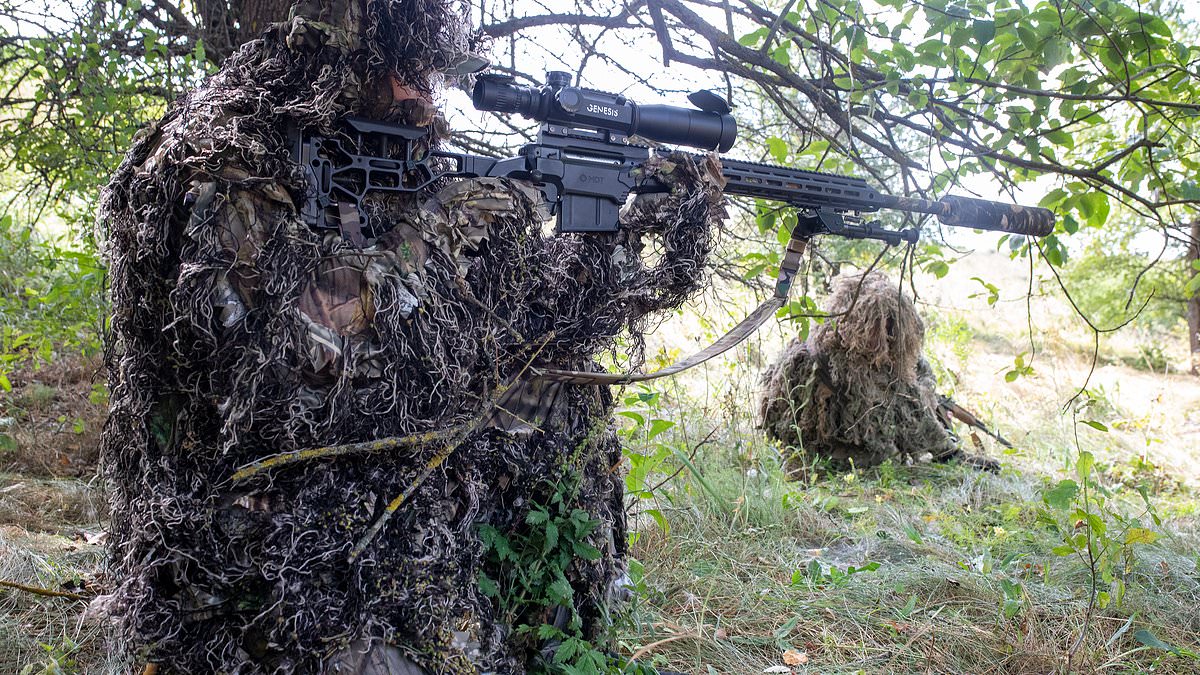Ukraine’s advance into Russia has left Vladimir Putin’s border defences in ‘disarray’, the Ministry of Defence said yesterday.
An MoD analysis of the offensive inside Russia’s Kursk and Belgorod regions said Moscow’s defences were not prepared – but warned that forces had been redeployed.
The intelligence update said the past three months had seen Russia suffer its worst casualties since the start of the war.
In a post on social media, the MoD said: ‘Poorly trained Russian soldiers are being used as cannon fodder in an attempt to overwhelm strong Ukrainian defences.’
Russia has accused Nato and the West of aiding Ukraine’s incursion, including by allowing the use of military equipment and weapons.
British Challenger 2 tanks are understood to have been used, and UK Government policy allows Ukraine to use British weapons on Russian soil, although not long-range Storm Shadow missiles.
Writing in today’s Mail, former prime minister Boris Johnson says it is time to allow the powerful missiles to be used inside Russia.
A senior aide to Ukrainian president Volodymyr Zelensky said the assault on Kursk and Belgorod was aimed at forcing Putin to the negotiating table, and not an attempt to occupy Russian territory.
Mykhailo Podolyak said: ‘We need to inflict significant tactical defeats on Russia. In the Kursk region, we clearly see how the military tool is objectively used to convince the Russian federation to enter into a fair negotiation process.’
Moscow claimed its forces were repelling the advances, and said it had carried out a successful air strike on Ukrainian forces in Kursk.
It came as Russian troops moved closer to the key city of Pokrovsk in Donetsk, prompting Kyiv to tell residents to leave.
Meanwhile, Ukrainian officers fighting in the Kursk offensive have implored Britain to green-light the use of Storm Shadow missiles to strike targets deep into Russia.
Deploying the British long-range rockets would allow Kyiv’s forces to sever vital supply lines by striking key infrastructure up to 150 miles across the Russian border, Dmytro Lantushenko, the captain of a mortar brigade involved in the Kusk incursion declared yesterday.
‘Those who are able to control their supply flows can maximise the use of their forces… If we had Storm Shadows we would be able to strike logistics hubs and railways and disrupt those lines,’ he told the Times.
British-made weaponry has reportedly been used to great effect by Kyiv’s troops in their foray into Russia already.
Several Challenger-2 tanks are believed to have forged across the border as part of the invasion force – though Russian military bloggers gloated yesterday that drones had successfully destroyed one of the British-made vehicles used in the offensive.
Lantushenko’s pleas for Storm Shadow missiles came a day after Ukrainian President Volodymyr Zelensky claimed drones are simply not enough to destroy key Russian military infrastructure and hammer home his advantage in Kursk.
‘Our Ukrainian drones work exactly as they should, but unfortunately, there are things that cannot be done with drones alone,’ the Ukrainian president said in his nightly address Wednesday.
‘We need other weapons – missiles… long-range decisions for Ukraine. This must be done. The bolder our partners’ decisions, the less Putin will be able to do about it.’
Newest NATO member Sweden declared yesterday morning that Ukraine has the right to defend itself both inside and outside its territory, with Kyiv’s Western allies seemingly supportive of the incursion in Kursk.
But approving the use of long-range missiles on Russian soil would signify a major shift from British, US and European governments who have thus far provided weaponry to Kyiv on the proviso they are not used for offensive strikes in Russia.
Vladimir Putin and top-ranking Russian officials have trumpeted incessantly that they would consider any Western country to have directly entered the conflict should its weapons be used to attack Russian land, sparking fears that such a move could trigger the descent into World War III.
However, Taras Kuzio, a professor of political science at the National University Kyiv-Mohyla Academy, posited that the assault on Kursk has shown that the fear of crossing Russian ‘red lines’ that could lead to nuclear escalation ‘is a myth’.
Sir Keir Starmer told reporters en route to Washington for NATO’s 75th-anniversary summit in July that decisions on the use of UK-supplied long-range Storm Shadow missiles were for the Ukrainian armed forces to make.
Many believed this indicated that Kyiv had been granted permission to use the missiles to strike targets on Russian soil.
But Downing Street was later forced to clarify that, although Ukraine was permitted to use UK-supplied weapons in Russia, the deployment of the long-range missiles had not been granted.
